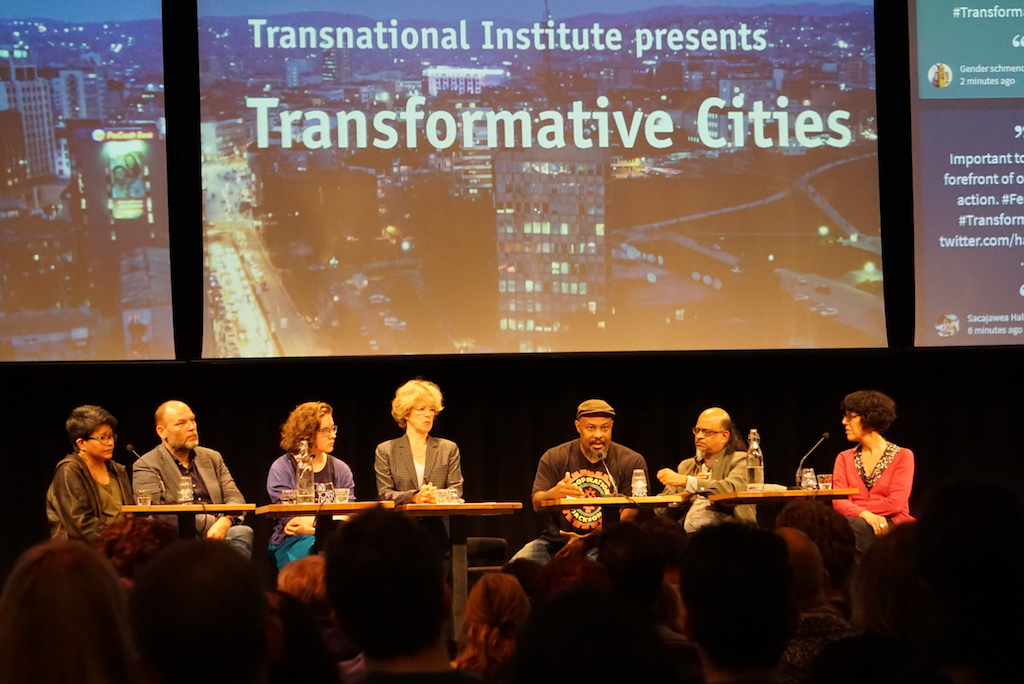|
Dear reader,
Just last week, the rescue ship Aquarius picked up 629 migrants, including 123 unaccompanied minors and seven pregnant women, in the Mediterranean Sea. Sadly, both Italy and Malta denied them sanctuary, and they had to endure another week of horrendous conditions at sea, before they finally made it to Spain. This is the latest in a series of heartbreaking stories about migrants risking their lives trying to get to Europe.
20 June 2018 marks the 18th commemoration of World Refugee Day. As the world notes with horror the cruelty of US family separation tactics and Europe's disastrous and unjust policies, the arms and security firms positioning themselves as experts on border control receive very little attention. Read more about how the security industry influences policy and reaps the rewards of EU migration control.
Do you stand #WithRefugees? Please sign the UNHCR online petition and express your support!
|
|
|
|
|
|
An obscure international agreement, the Energy Charter Treaty allows corporations to obstruct the transition from climate-wrecking fossil fuels towards renewable energy. We need to block its expansion before it locks yet more countries into corporate-friendly energy policies that threaten our future survival.
Read more or visit energy-charter-dirty-secrets.org
|
|
|
|
| |
|
|
|
|
|
Walden Bello
Can Myanmar take a path to sustainable development that avoids the pitfalls of the orthodox development paradigm? This report argues that this is not only necessary but possible. It proposes alternatives to industrialisation and trade, focused on socially useful production.
Read more
|
|
|
|
| |
|
|
|
|
|
Rita de Cácia Oenning da Silva and Kurt Shaw
Brazilian children on both sides of the class divide are caught between walls of imagination and fear. Exploring their resentments, fears, and desires leads to unexpected insights into Brazil’s social apartheid, the new authoritarianism that has emerged to defend it, and possible ways to escape the vicious cycle of repression.
Read more
|
|
|
|
|
|
|
|
|
On Friday June 8 Transformative Cities most inspiring initiatives were announced during a public event organised by TNI in Amsterdam.
 Photo credit: Jess Graham Photo credit: Jess Graham
Among the participants were Saskia Sassen from Columbia University, and recently-elected Deputy Mayor Rutger Groot Wassink, who leads the inclusion of Amsterdam in the network of Fearless Cities initiated in Barcelona in June 2017.
The most inspiring initiatives were those developed by the Fundación Abril/Platform for public community partnerships in Cochabamaba (Bolivia) in the area of Water, the Roundtable on the Energy Transition in Cádiz (Spanish State) on Energy, and the Centre of Indian Trade Unions in Solapur (India) on Housing.
Following this public recognition of the inspiring and transformative character of these initiatives, TNI hopes to continue to support them by giving more visibility and facilitating processes of exchange and collective learning. |
|
|
|
|
|
|
|
| |
| |
|
|
Apreciado lector, apreciada lectora:
La difícil situación de los 66 millones de personas del mundo desplazadas por la fuerza parece perturbar la conciencia de la Unión Europea únicamente cuando el foco de los medios de comunicación muestra una tragedia en el Mediterráneo o en sus fronteras. Este 20 de junio, coincidiendo con el Día Mundial de los Refugiados, nos gustaría invitarte a examinar una cuestión que no solemos encontrar en los grandes medios, que por lo general alimentan un discurso en el que abundan palabras como ‘mafias’, ‘avalancha’ o ‘inmigrantes ilegales’.
¿Dónde están realmente las fronteras de la UE? ¿Y qué efecto tienen las políticas europeas sobre la llamada crisis de los refugiados? En nuestro último informe, parte de la serie Guerras de frontera, podréis descubrir todas las claves sobre las políticas de externalización de las fronteras europeas, los acuerdos que se han firmado con numerosos países y las grandesempresas y las entidades que se benefician con ello.
|
|
|
|
|
|
La UE ha desarrollado políticas para externalizar sus fronteras a fin de que las personas desplazadas por la fuerza ni siquiera lleguen a ellas. ¿Qué grandes empresas se están beneficiando con ello? ¿Y cuáles son las consecuencias para los derechos humanos?
Leer más
|
|
|
|
| |
|
|
|
|
|
El Tratado sobre la Carta de la Energía es el arma secreta de la industria de los fósiles para frenar la transición ecológica,ya que otorga a las grandes empresas una enorme influencia sobre las políticas energéticas de casi 50 países. En pleno proceso de ampliación en África, Asia y Latinoamérica, os presentamos el primer gran estudio hasta las fecha con una mirada crítica sobre este opaco acuerdo.
Leer más
|
|
|
|
| |
|
|
|
|
|
El idioma –y, por lo tanto, la traducción y la interpretación– es una cuestión de acceso, de participación, de poder. ¿Cómo podemos garantizar la justicia lingüística en los movimientos sociales transnacionales?
Leer más
|
|
|
|
| |
|
|
|
|
|
|
| |